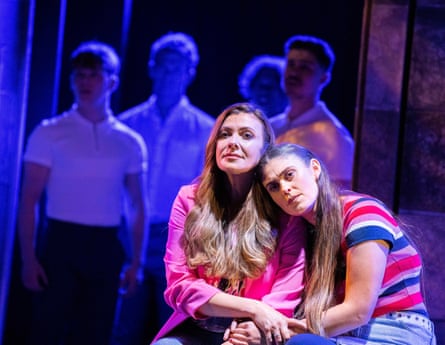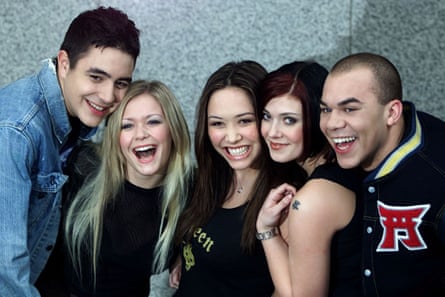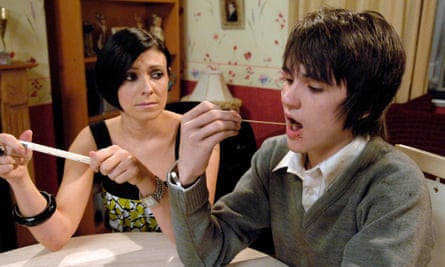‘You were good today, I’m proud of you,” Kym Marsh calls across the hotel room. Her 26-year-old daughter, Emilie Cunliffe, has arrived from rehearsals and they’re going out tonight. Marsh switches into mothering mode: “Do you want some dinner? Get some food.” The pair are starring in Greatest Days, a musical based around Take That songs – renamed from its 2017 version, The Band – which has just started touring the UK.
Both Marshes play the lead character Rachel, who, as an adult, gets back in touch with her old mates to see their favourite boyband from their teen years. It’s a musical about the passing of time, friendship, loss, and the place and power pop music has in our lives. A majority of the audience will be familiar with the Take That hits – so are they worried about people dancing and singing along, which has caused disruption at other shows recently? “It’s Take That – people are going to know the tunes,” says Marsh. “There’s always a part in a musical where the audience are encouraged to join in, usually at the end. I think it’s a fine line between enjoying yourself and disrupting the entire thing. It’s nice when people are enjoying it, but we’ve got a job to do.”
This is Marsh’s first stage musical since she appeared in Saturday Night Fever in 2004. That came after pop stardom – she was in the reality TV band Hear’Say, created through the TV show Popstars, then had a fairly short-lived solo career followed by a successful move into acting. In 2019, she left Coronation Street, where she had been for 13 years, did Strictly Come Dancing, and just yesterday was doing something for her role on the BBC school drama Waterloo Road. She is also a presenter on the daytime TV show Morning Live. It’s her work ethic, says Emilie, that most made an impression on her and her older brother during their childhood. “She goes out and she does what she does, for us.”
Marsh was watching Emilie rehearse today, and someone commented on the look of pride on her face. “It’s beautiful to see her right at the start of her career, because I remember what that feels like,” she says. She is restrained enough not to burst into the relevant lyric from a Take That song – “Someday soon this will all be someone else’s dream” – but I’m not.

Is it hard not to slip into a mothering role at work? “If she does need anything, I’m there. But we don’t have that kind of mum-and-daughter relationship because she’s an adult now and she’s a mum herself.” Marsh was in her early 40s when she became a grandmother, and now has three grandchildren. “I love it. It’s my favourite job in the world,” she says.
Often Emilie will ask her advice, Marsh says, knowing she will be honest. “My dad was my worst critic. I mean, he’s my biggest supporter and, because of that, if I wasn’t firing on all cylinders he would tell me. I respect that. I’m not one of those parents who says: ‘That was amazing!’ if it wasn’t.”
Marsh was a teenager when Take That were at their 90s peak. (Her favourite? Gary Barlow). “Do you remember when they first came out and wore that kind of leather gear?” she laughs. She was 18 when her son was born (Emilie came along two years later), around the time Back for Good was No 1. “It was the only song I could get him to go to sleep to,” she says. She used to carry him around her living room, rocking him to it.

Marsh had always wanted to be a performer, and loved being on stage. “I think about how alive I felt. I still do – when we’re on stage and we’re actually doing the show, you become someone else almost.” She was bullied “quite badly” at school, she says, and performing “was my escape”. “I got on stage and just became this confident person which, in real life, I wasn’t.” It’s why she prefers acting to singing now: “I get to be someone else for a bit.”
Marsh, who grew up in Wigan, spent her childhood singing, and as a teenager had a deal with a Manchester record label. Her parents would put her on the train to work in London for the day as a session singer. In her early 20s she was a full-time single mother to two young children but her parents encouraged her to keep going with her dream.
“They said: ‘It’s more of a reason for you to push forward, because you’ve got children relying on you now.’ And they were right, it absolutely was. I always say my children are my real driving force because, in the beginning, it was about creating a life for them.” She was surviving on benefits and maintenance payments from the children’s father – a life where “you live hand-to-mouth”, she says. Her sister had also had children young and Marsh remembers them clubbing together to buy packs of nappies.
The 2001 ITV show Popstars was the precursor to The X Factor, and Marsh borrowed a friend’s car to get to the audition and queued in the cold. She got in, along with four others, and Hear’Say became huge when the show aired. “This whole life just came from nowhere,” says Marsh. She loved it but it was also tricky. “There were elements that changed completely for the better and then there were other times when I wasn’t with my kids. Those are the things I found hard.”

The tabloid intrusion was relentless, too. “They were going through our bins. It was intimidating.” Because Hear’Say were one of the first reality-show bands, managing their career was also something of an unknown for the people around them, says Marsh. “There was burnout. We ended up on everything, at everything, in everything, and people got bored of us quicker than they would normally have. They were new to it as well, so it wasn’t anyone’s fault. But I feel we probably didn’t have enough support around us, and I think that’s why everything went wrong.”
There were stories about Marsh and her bandmates not getting on – “If you believed everything you read about me at that time, I was the biggest bitch in the world,” she says – and not long after Marsh left the band, Hear’Say imploded. Her bandmate Suzanne Shaw has talked about using alcohol and sleeping pills to cope, but Marsh seems to have come through it relatively unscathed. It helped that she left before things got really bad, when Hear’Say became mercilessly mocked by the public, she says. “Also, we all were different. They were younger than me. I had children, so I had different responsibilities. That probably grounded me more. That’s not to say I didn’t experience what they experienced: I went through my own trauma. But because I had the children, and so much support around me – my parents moved to London – I feel like I got through that.”
Marsh had two Top 10 singles and released an album as a solo artist before she was dropped by her record label. She wasn’t sure what she would do next but tried to believe something would come along. If it didn’t work out, she thought, she would go back to college to train as a hair and makeup artist – she had enrolled just before the Hear’Say audition. Then she got the role in Saturday Night Fever and rediscovered her love of acting.
Although she was wary of people dismissing her as a reality TV pop star trying to become an actor, she slogged away at auditions. Her part as Michelle Connor in Coronation Street, she says, was initially only for three episodes. “I ended up there for 13 years. It was a reinvention and it was just nice to have people who would take a chance on you. I learned so much at Corrie – I never went to drama school, I learned by watching other people.” One of her storylines, in which her character gave birth to a baby too premature to survive, was based on Marsh’s own experience of the death of her son Archie, and she was praised for raising awareness of an experience that is still little talked about.
She has been through a lot – teenage motherhood, failed marriages, personal tragedy, public scrutiny – but her resilience is learned, she says, rather than natural: “It’s just experience.” Marsh left Coronation Street to try something new. “I think I am a risk-taker because ‘What if?’ is always worse. Comfortable is not good. I always want to be that person who has a go, because I wouldn’t want to sit there years down the line and say: ‘I wonder what would have happened if …?’”
"hear" - Google News
May 17, 2023 at 10:29PM
https://ift.tt/brKmWke
‘Comfortable is not good’: Kym Marsh on the horror of Hear’Say – and landing the Take That musical - The Guardian
"hear" - Google News
https://ift.tt/1OUEo4G
https://ift.tt/Dsuzr1w
Bagikan Berita Ini














0 Response to "‘Comfortable is not good’: Kym Marsh on the horror of Hear’Say – and landing the Take That musical - The Guardian"
Post a Comment